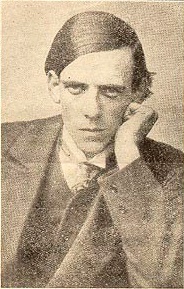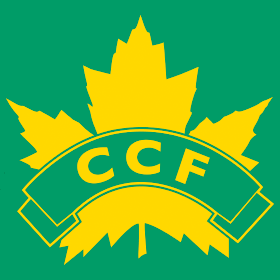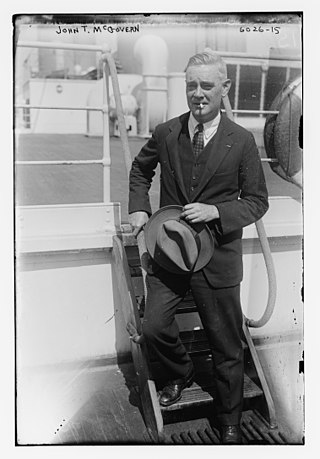Related Research Articles

The Independent Labour Party (ILP) was a British political party of the left, established in 1893 at a conference in Bradford, after local and national dissatisfaction with the Liberals' apparent reluctance to endorse working-class candidates. A sitting independent MP and prominent union organiser, Keir Hardie, became its first chairman.

James Maxton was a British left-wing politician, and leader of the Independent Labour Party. He was a pacifist who opposed both world wars. A prominent proponent of Home Rule for Scotland, he is remembered as one of the leading figures of the Red Clydeside era. He broke with Ramsay MacDonald and the second minority Labour government, and became one of its most bitter critics. As the leader of the Independent Labour Party (ILP), he disaffiliated the ILP from the mainstream party in 1932. Afterwards, he became an independent dissident outside front-line politics.

The Co-operative Commonwealth Federation (Manitoba) (CCF), known informally as the Manitoba CCF, was a provincial branch of the national Canadian party by the same name. The national CCF was the dominant social-democratic party in Canada from the 1930s to the early 1960s, when it merged with the labour movement to become the New Democratic Party. The Manitoba CCF, created in 1932, played the same role at the provincial level.
Independent Labour Publications is a left-wing pressure group inside the British Labour Party. It is the successor to the Independent Labour Party and is mostly known simply as "The ILP" in order to maintain that link with its predecessor organisation.

John Turner Walton Newbold, generally known as Walton Newbold, was the first of the four Communist Party of Great Britain members to be elected as MPs in the United Kingdom.

The 1948 Glasgow Camlachie by-election was held on Wednesday 28 January 1948, following the death of the sitting Member of Parliament, Campbell Stephen.

John McGovern was a Scottish socialist politician.
Charles Andrew Smith MM known as C. A. Smith, was an English politician who held prominent positions in several minor parties.
Raymond Corrick "Ray" Challinor was a Marxist historian of the British labour movement.
The 1942 Cardiff East by-election was a parliamentary by-election held for the British House of Commons constituency of Cardiff East on 13 April 1942.
France Littlewood was a British socialist activist.
The National Union of Ex-Servicemen (NUX) was a socialist ex-servicemen's organisation founded in London in early 1919 with close links with the Labour Party. Many of its members were formerly supporters of the National Federation of Discharged and Demobilized Sailors and Soldiers and the Soldiers, Sailors and Airmen's Union (SSAU). Within six months it had grown from one branch with fifty members to over one hundred branches and claimed a membership of nearly 100,000. Its membership was boosted by the stance of the Federation against the 1919 United Kingdom railway strike in the autumn of that year: it called on Prime Minister David Lloyd George to "hold firm against Labour tyranny", causing tension in its ranks and prompting many left-wing members to leave and join NUX, which had supported the strike. By the end of 1919 NUX had 200,000 members and 200 branches.
Elijah Sandham was an English Independent Labour Party (ILP) politician from Lancashire. He sat in the House of Commons from 1929 to 1931 as the Member of Parliament (MP) for Kirkdale division of Liverpool, and in 1934 he led the breakaway Independent Socialist Party.

The British Socialist Party (BSP) was a Marxist political organisation established in Great Britain in 1911. Following a protracted period of factional struggle, in 1916 the party's anti-war forces gained decisive control of the party and saw the defection of its pro-war right wing. After the victory of the Bolshevik Revolution in Russia at the end of 1917 and the termination of the First World War the following year, the BSP emerged as an explicitly revolutionary socialist organisation. It negotiated with other radical groups in an effort to establish a unified communist organisation, an effort which culminated in August 1920 with the establishment of the Communist Party of Great Britain. The youth organisation the Young Socialist League was affiliated with the party.
The Socialist Party of Northern Ireland, sometimes known as the Northern Ireland Socialist Party, was a small socialist group based in Northern Ireland in the 1930s.
The Popular Front in the United Kingdom attempted an alliance between political parties and individuals of the left and centre-left in the late 1930s to come together to challenge the appeasement policies of the National Government led by Neville Chamberlain.
The Scottish Socialist Party (SSP) was an organisation of former Independent Labour Party members who wished to remain part of the Labour Party after their former party disaffiliated.

Frederick Brocklehurst (1866–1926) was a British political activist best known for his early involvement in the socialist movement.
John Thomas Abbott was a British socialist activist.
Forward was a socialist newspaper published in Scotland from 1906 to 1959.
References
Gidon Cohen (2003) The Independent Socialist Party in Gildart, Howell and Kirk (eds) Dictionary of Labour Biography
- ↑ "Article 1", Manchester Guardian , 9 January 1945, p.6